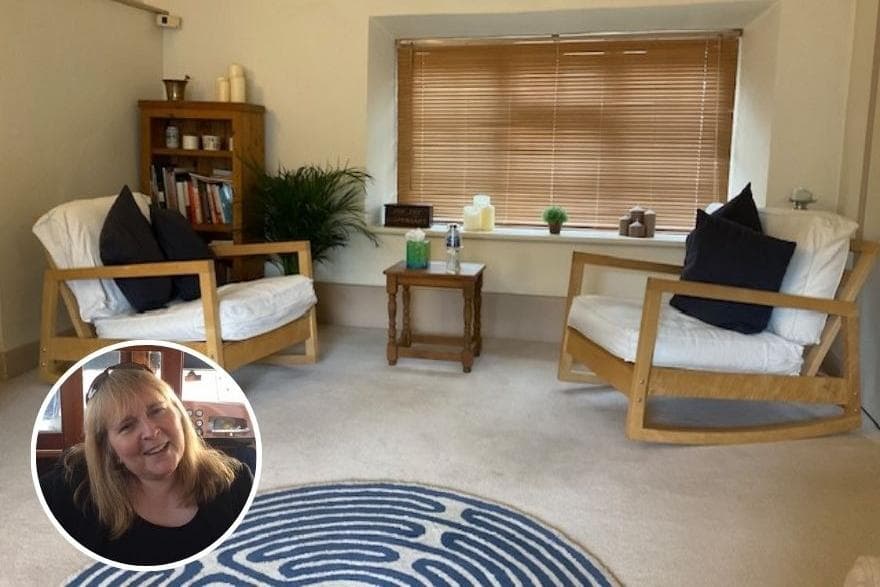Watch more of our videos on Shots!
and live on Freeview channel 276
Visit Shots! now
A Northampton private practice, specialising in eating disorders, is introducing a new telephone helpline service to tackle the rise in need across the county.
Sue Wilson is proud to run her practice, Eating Disorder Consultancy Service, in Dallington and it has become a well-renowned mental health resource for the community over the past 16 years.
The fully qualified nurse practitioner, with 43 years of experience, first worked at St Andrew’s Healthcare and has built on her knowledge ever since.
Sue currently sees patients for batches of short or long-term eating disorder treatment and although she runs a private practice, she is passionate about being accessible in the current economic climate.

 Sue Wilson is proud to run her practice, Eating Disorder Consultancy Service, in Dallington and it has become a well-renowned mental health resource for the community over the past 16 years.
Sue Wilson is proud to run her practice, Eating Disorder Consultancy Service, in Dallington and it has become a well-renowned mental health resource for the community over the past 16 years.
That is why she is launching a local telephone helpline service, aimed at guiding individuals to access the right help for them and their families – and to navigate the “increasingly complex” health systems in the NHS.
Sue can offer telephone advice prior to people’s GP appointments about how to access services, and what families are entitled to as part of the national guidelines.
Though Sue encourages people to pre-book their telephone appointments, a drop-in helpline on Thursdays from 4pm until 6pm will be launched for people to ring for a short conversation.
The focus of this new offering is advisory and not treatment for specific cases, as well as being open to professionals and frontline services who may need advice or support in managing eating disorder situations.

 Sue currently sees patients for batches of short or long-term eating disorder treatment and although she runs a private practice, she is passionate about being accessible in the current economic climate.
Sue currently sees patients for batches of short or long-term eating disorder treatment and although she runs a private practice, she is passionate about being accessible in the current economic climate.
When asked why 16 years ago was the right time to launch her private practice, Sue said: “I realised there was a massive gap in service provision in the NHS for children transitioning to adults and over 65s. People fell through a gap.”
Having worked at St Andrew’s Healthcare developing the eating disorder service for two decades, as well as in the private sector, Sue knew the gap she needed to fill.
As an advanced nurse practitioner, and strictly not a counsellor, Sue offers assessments, second opinions and complex case management with the physical and psychological implications of eating disorders.
“Every treatment plan is bespoke,” said Sue. “I assess chronic eating disorders and acute illnesses, mainly anorexia and bulimia nervosa, with a particular interest in adults over 40.”
Like all of Sue’s services, the telephone helpline will be available to anyone aged 13 and over and two pathways will be offered – ‘finding your way’ and ‘navigating help’.
“The well-known national picture is that referrals to CAMHS have peaked post-Covid and eating disorder services have had a huge spike in referrals,” said Sue. “They’ve struggled to cope with that.
“I didn’t notice until November last year until a number of patients, who were too physically ill for me to take on, reached out. It started to peak just before Christmas when five patients came to be assessed and were so poorly I had to send them straight to the hospital.
“They were struggling to get face-to-face GP appointments and had calls. The GP did not see their low weight and the patients were in denial. GPs were having difficulties referring them to specialist eating disorder services too.”
Sue’s helpline will assist people in securing GP appointments and infiltrating the services by knowing what to ask for – as the nurse practitioner will give them as much help as they need over the phone to make this a reality.
Anyone wanting to utilise the helpline should call or text 07444 283796. Sue can provide advice over text if that is more comfortable, and also encourages those seeking help to utilise national Beat services.
“I offer a more local provision,” she said. “Having worked at St Andrew’s and in the community, I know the local services and how to navigate them really well.
“Remember that mental health is the same, and sometimes more serious, than physical health. You must seek help early for any symptoms. Treat it as if you had physical symptoms you were worried about, as people tend to leave mental health behind.”

